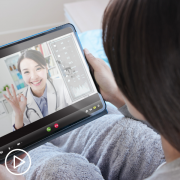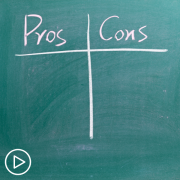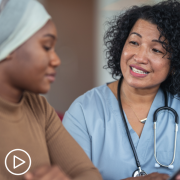Empowering Providers to Empower Lung Cancer Patients
Empowering patients is at the heart of efforts at Patient Empowerment Network (PEN), and work toward reducing health disparities is part of conversations among healthcare professionals. Precision medicine and the use of biomarker testing is one area of interest in efforts to eliminate healthcare disparities.
With this in mind, PEN has taken on a new initiative, the Empowering Providers to Empower Patients (EPEP) initiative. Starting in lung cancer, the program expands PEN’s reach to healthcare professionals with the goal of improving physician-patient communication; shared decision-making; and the role that lung cancer patients, survivors, care partners, and healthcare professionals each play in the shared decision-making process.
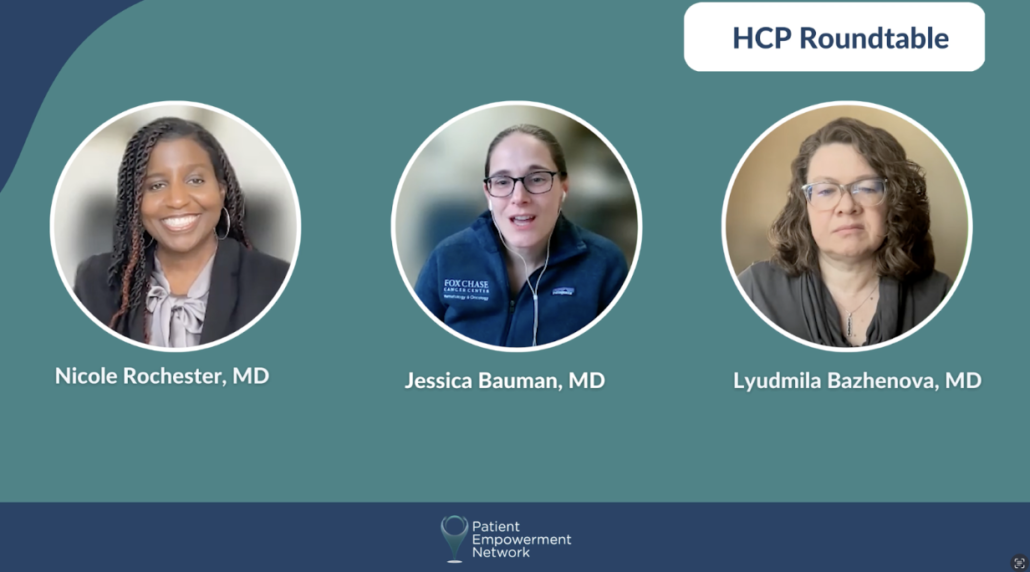
The EPEP initiative includes the following resources:
- Needs Assessment outlines key factors that enable patient empowerment, attributes of an empowered patient, and advice for healthcare professionals to perform a needs assessment for each patient.
- EPEP Roundtables with lung cancer experts Dr. Heather Wakelee, Dr. Lyudmila Bazhenova, Dr. Leigh Boehmer and Dr. Jessica Bauman as they discuss a range of topics including ways to improve physician-patient communication, learnings from tumor boards, collaboration between academic and community oncologists, biomarker testing, and addressing barriers to biomarker testing.
- EPEP Vignettes where lung cancer clinician Dr. Jhanelle Gray from Moffitt Cancer Center shares her experience in biomarker testing, personalized combination therapeutics, and best practices in treating and empowering patients toward more equitable and culturally sensitive care.
- EPEP Biomarker Testing Resource Guide that covers benefits of biomarker testing, when to test, dos and don’ts of biomarker testing, perspectives from a patient and a clinician, and resources for patients.
- EPEP Portal utilizes PEN’s robust resource library and that of numerous trusted advocacy partners to create a vetted list of patient education resources. PEN delivers a curated PDF according to your interests and delivers it efficiently to your inbox.
- Infographics that address the differences between cultural competence versus cultural humility and key steps to work toward practicing cultural humility to help empower your patients in their lung cancer care.
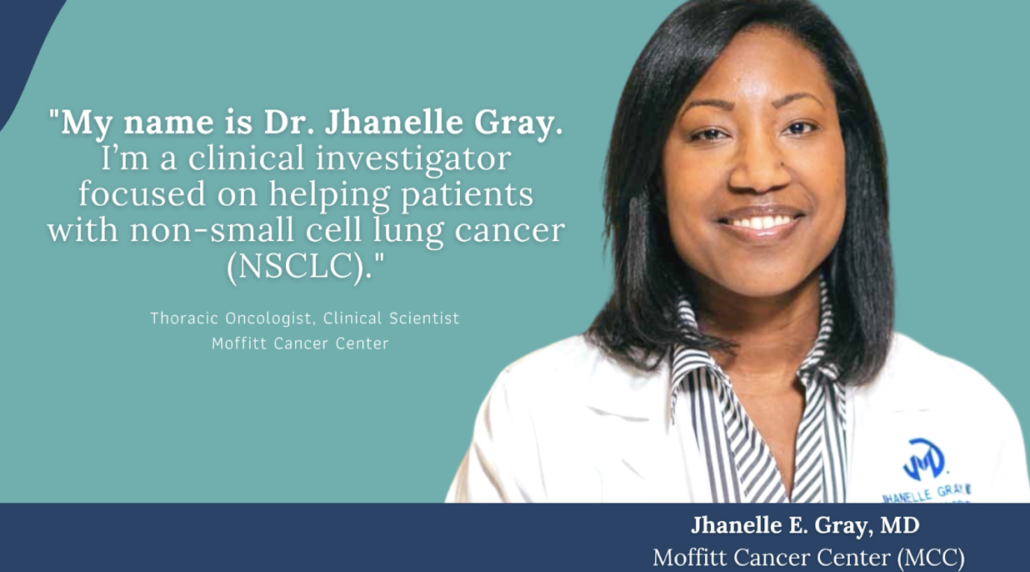
Key Takeaways to Help Empower Lung Cancer Patients
PEN had the opportunity to interview experts Dr. Jhanelle Gray, Dr. Heather Wakelee, and Dr. Leigh Boehmer to learn about some of their expertise. They shared their perspectives about vital ways that they work with patients to help empower them and to work toward the best personalized care for each patient.
Dr. Boehmer shared the importance of biomarker testing to identify driver mutations, “…more than half of patients who’ve developed lung cancer who have never smoked or have a light smoking history are going to have an actionable driving mutation, and even in people who do have a smoking history, of any ethnic background, they’re still 10 to 20 percent or maybe more as we identify more of these driver mutations, where that’s what’s really the force in the tumor.
And if you find it and you can start someone on the appropriate targeted therapy, usually across multiple trials, the toxicity is less than you would get with chemotherapy or immunotherapy…the probability of response is over half, you know, if someone’s going to have a benefit that that’s going to help them feel better for a period of time in controlling their cancer, it really drastically changes their whole tumor outcome, they’re going to be living longer, feeling better, and ultimately that’s our goal when we’re helping someone with metastatic disease…You have to have the physician aware of the importance of finding the mutation, altering the treatment as necessary, and giving that patient the best possible option for care.”
Dr. Gray and Dr. Boehmer also have preferred medical terms when they explain to their patients about biomarker testing. Dr. Gray prefers to steer away from terms that have to do with genomics or genetics and uses the terms “biomarker testing” or “comprehensive biomarker testing” instead. While Dr. Boehmer shares, “I think that’s really important that people always remember to talk about the tumor and not about the mutation in the person, that’s really, really critical.”
Physician Best Practices for Biomarker Testing
With her experience in using biomarker testing in planning personalized combination therapeutics, Dr. Gray shares advice for other healthcare providers. “I think for a provider it is going to be very important when a patient is newly diagnosed with non-small cell lung care especially when they have advanced and later stages as this should be a comprehensive test. This should be a certified assay. I think they should also look at turnaround time for this testing, does the assay include a liquid biopsy portion and a tissue biopsy portion? Is there one that you want to run before the other?
Many times what I will do when I meet a patient initially and they have an advanced or metastatic stage non-small cell lung cancer, I’ll send off the liquid biopsy right then and there, the same day in the hope that I can get the test results back within 7 to 10 days. I will also order the tissue testing. Should the liquid biopsy results from the blood specimen come back sooner, then I can cancel the tissue testing if I feel confident enough in the results. This will then preserve tissue for later analyses. It can also preserve tissue should they need to enroll in an innovative clinical trial and expand their therapeutic options.”
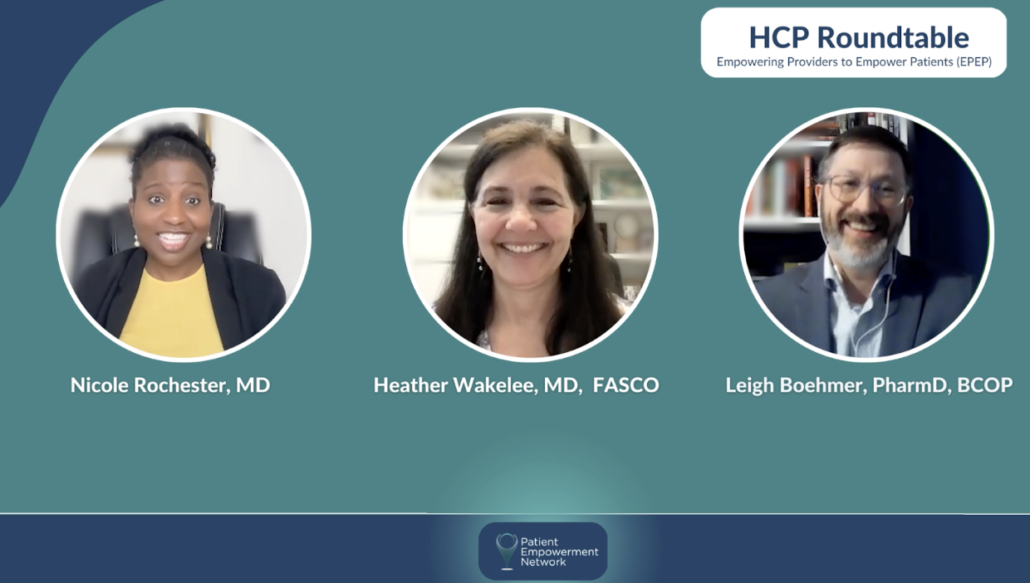
Advocacy for Biomarker Testing
Dr. Wakelee speaks to advocacy for biomarker testing, “…many organizations, including IASLC, including ACCC, including NCCN…I mean, you could name any organization that’s involved in cancer care and education, is really focusing on this issue of making sure that every oncologist knows the importance of doing biomarker testing for patients with non-small cell lung cancer, that we are trying to expand that not just to the oncologist, but also to the folks making the diagnosis, so they can be aware as well…The more people who are aware that’s a standard of care in treating lung cancer, the more that’s going to happen, and then continuing to explore those financial barriers, and as more agents are FDA-approved, where that becomes a preferred first sign option, but you only know that if the testing’s happened, that leads to campaigning to make sure that the testing is being covered as well.”
Dr. Boehmer further explains about the logistics of advocating for biomarker testing. “ACCC…recognizes that a lot of community programs don’t have kind of operational best practices for how to incorporate biomarker testing into a patient’s journey…we’re working on creating care pathways which will help multidisciplinary clinician teams integrate discussions of biomarker testing and its impact at various critical time points along a patient’s diagnosis to treatment, to survivorship or end-of-life care…talking about when and how to have meaningful conversations, and then doing it with health-literate, vetted resources and through a lens of equity and shared decision-making, because you look like me, you had success with it. I’m going to do it for my at-risk patients as well, because one, it’s the right thing to do. And two, you taught me how to do it, and three, you told me what success looks like so I can measure myself against you, and that’s a successful model for scalability.”
And Dr. Gray shares advocacy organizations and ways to move toward biomarker testing equity for all patients. “For those again who are having some difficulty with getting biomarker testing for their patients, I would strongly encourage you to find an advocacy organization such as American Lung Association, LUNGevity, GO2 Foundation, there are many many others out there that are very much interested in improving access to patients with non-small cell lung cancer. This is really a critical area of need and that we really have to drive forward with healthcare equity in this setting…And so, I think putting all this together and coming together as a field is where we can move together and with the patients, the providers, and the advocacy organizations I think that we should all feel empowered to move the needle forward for our patients.”
The bottom line is, while oncologists have more tools to treat lung cancer, access and language remains a big factor in biomarker testing. Comprehensive biomarker testing can play a very important role in the personalized treatment for patients with non-small cell lung cancer (NSCLC), but many questions remain. How do we improve clinician-patient conversations in biomarker testing? And how do we remove barriers that can impede an HCP’s ability to treat patients with personalized care? As the lung cancer field continues to experience tremendous growth in precision medicine, we hope healthcare providers can take advantage of these timely resources of the EPEP initiative to work toward equitable and culturally sensitive care for lung cancer patients.

